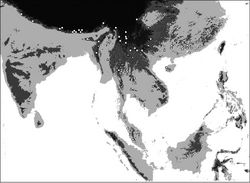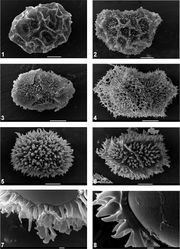Oleandra wallichii
| Notice: | This page is derived from the original publication listed below, whose author(s) should always be credited. Further contributors may edit and improve the content of this page and, consequently, need to be credited as well (see page history). Any assessment of factual correctness requires a careful review of the original article as well as of subsequent contributions.
If you are uncertain whether your planned contribution is correct or not, we suggest that you use the associated discussion page instead of editing the page directly. This page should be cited as follows (rationale):
Citation formats to copy and paste
BibTeX: @article{Hovenkamp2012PhytoKeys11, RIS/ Endnote: TY - JOUR Wikipedia/ Citizendium: <ref name="Hovenkamp2012PhytoKeys11">{{Citation See also the citation download page at the journal. |
Ordo: Polypodiales
Familia: Oleandraceae
Genus: Oleandra
Name
Oleandra wallichii Hovenkamp & Ho, 2012 – Wikispecies link – Pensoft Profile
- Oleandra wallichii C.Presl, Tent. Pterid.: 78. 1836. Fée, Mém. Foug., 5. Gen. Filic.: 304. 1852. Hook., Sp. Fil.: 158. 1862. Ching, Fl. Reipubl. Popularis Sin. 2: 321. 1959. Shieh, DeVol & Kuo in Huang, Fl. Taiwan, ed. 2.: 203, Pl. 83. 1994. X.C.Zhang, Ching Mem. Vol.: 94. 1999. R.M.Tryon, Rhodora 102: 434, fig. 5. 2001. Aspidium wallichii Hook., Exot. Fl.: Pl. 5. 1823. Pl. Neuronia asplenioides D.Don, Prodr. Fl. Nepal.: 7. 1825., nom. illeg. Type: NEPAL.Wallich s.n. (holotype K; isotypes: BM, PE).
- Oleandra wallichii var. lepidota Christ, Bull. Acad. Int. Geogr. Bot. 15: 140. 1906. Type: CHINA. Western China: Wilson 5246 (holotype P; isotype: K).
Description
Rhizome creeping, 3–4 mm thick (2–3 when dry), white waxy in the older parts, with long, leafless parts alternating with more or less dense clusters of very short phyllopodia, usually less than 2 (–5) mm high, of which usually only 1–2 bear fronds at the same time, branches usually in opposite pairs; in cross-section with weak sclerenchyma sheath and without sclerified strands, roots scattered, usually with long unbranched parts. Scales persistently covering the rhizome, peltate, 3–7 ×1–1.3 (–1.5) mm, base appressed, with dark center and lighter margin, acumen brown, usually recurved, with ciliate margin, apex twisted and with frizzly cilia. Fronds monomorphic; stipe 1–5 cm long, with dark coloration on abaxial side often distinctly bicolorous, with catenate hairs; lamina 13–45 × 2–4.5 cm, base truncate to rounded, apex often abruptly caudate, texture thin-herbaceous, translucent, both surfaces densely set with catenate hairs 0.5–1 mm long; costa on lower surface in basal half of lamina with dark coloration, with copious 2–4 mm long pale scales. Sori close to costa, indusium thin, to 1 mm wide, glabrous or hairy. Sporangial stalk without glands below the sporangium. Spores echinate and ridged, perispore solid.
Distribution
Himalayas to Northern Thailand, Yunnan and Taiwan, 1600 to 3600 m. India, Nepal, Bhutan, China (Yunnan, Taiwan), Thailand.
Ecology
Mostly epiphytic, on mossy trunks, also on cliff faces or boulders.
Discussion
Oleandra wallichii differs from Oleandra undulata in the more wide-creeping rhizome that is often distinctly glaucous beneath and between the scales, without sclerenchyma strands; the often conspicuously bicolorous stipe, lamina with usually very distinctly apiculate apex and costa with frequent scales, sori constantly closely costal, with small indusia.
Taxon Treatment
- Hovenkamp, P; Ho, B; 2012: A revision of the fern genus Oleandra (Oleandraceae) in Asia PhytoKeys, 11: 1-37. doi
Images
|

